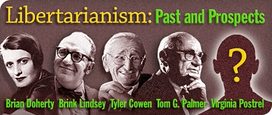Reflecting on our exchanges, I’m struck by the lingering division over what was wrong with socialism, and with socialists. Libertarians agree that socialism was wrong. We disagree on exactly why. So in part what we’ve been calling a division between the empiricist and deductivist strands of libertarianism also reflects different diagnoses of the nature of socialism. Was socialism a well-intended program for the relief of human suffering that went awry because it misunderstood the nature of markets—an empirical error? Or was it an envy-driven attack on wealth creation whose main goal was to attack the rich rather than to uplift the poor—a moral error?
The answer, of course, is both. Socialists were (and are) no more homogeneous than libertarians, and “socialism” included all sorts of different policy versions and psychological motivations. But I think that Hayek was in the main correct when he dedicated The Road to Serfdom to “Socialists of All Parties” and wrote, at least in the English context, with the assumption of shared humanitarian motives. Their problem wasn’t bad will. It was bad analysis.
The arguments about socialism are relevant today especially in the context of health-care policy, which Arnold Kling rightly argues has replaced traditional industries as one of the economy’s “commanding heights.” What’s wrong with advocates of national health insurance (of one kind or another)? Is it really that they are suggesting a wealth transfer to provide a safety net for the poor or medically unlucky? Or is it something more-systemic and empirical—a risk to the freedom of choice, the consumer feedback, the innovation, and the medical abundance that Americans value in the health-care market, as compromised as it is? Advocates of “universal health care,” especially those unfamiliar with the details of policy, often suggest that it’s simply a matter of will and beneficence, not tradeoffs, and that we can somehow give everyone top-flight care—bringing those outside the system to the level of those inside—while spending no more money. They do not acknowledge the very real consequences of rationing and price controls, in the long term as well as the short term.
Most people, including many libertarians and including me, could live with a simple cash transfer of X thousand dollars per uninsured person, coercive though it might be. But that’s not what’s involved, nor is the looming fiscal disaster the most pernicious result of Medicare and its ripple effects on private insurance. We now have a situation in which primary-care physicians can barely make a living, general surgeons and anesthesiologists are migrating to cosmetic surgery, the federal government is a ubiquitous presence in medical decision making, and wealthy people over 65 won’t fork over $20 for a flu shot. If all libertarians had to say about this issue is, “Taxation is theft,” we’d be doomed.

